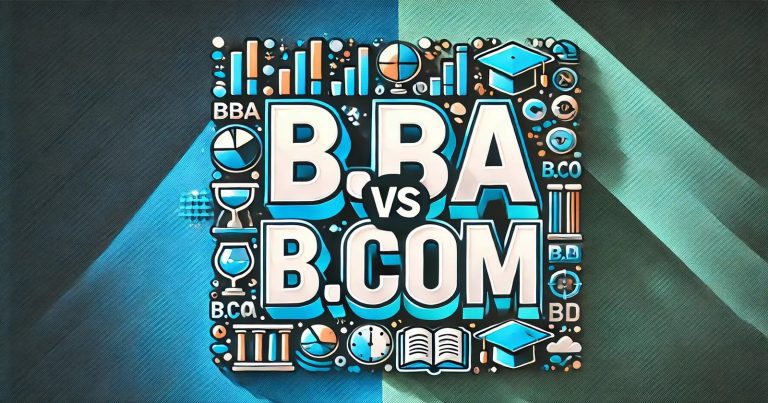Both qualifications are recognized as prestigious and open career opportunities in the business world, yet they target diverse areas of interest, abilities, and aspirations regarding careers. The BBA is a general management education that covers a wide range of business functions and business processes, whereas the BCom is an education model with a narrower scope on account, finance and economics. They each have distinctive benefits and build up separate occupational routes. The training of BBA vs BCOM allows students to decide which program is most likely to make them better prepared for the types of business work they want to be involved in.
What is BBA?
A Bachelor of Business Administration (BBA) aims to build a solid foundation of business models, leadership, and entrepreneurship. Such specialisations make the course more flexible and can be applied to certain sectors. BBA provides a practical approach to learning by incorporating industry visits, case studies, group discussions, and presentations. It can train students to take on management roles by developing communication, analytical, and strategic reasoning abilities.
What is the Scope of BBA?
The range of BBA is very large, especially for those students who aim to work in management or to be an entrepreneur. This program offers students the necessary knowledge and skills in a sequence that allows them to succeed in a wide range of industries.
- BBA also prepares students for graduate education fields, e.g., (Master of Business Administration) MBA. This course provides a solid basis for graduate work and is consonant with the curriculum of an MBA program.
- The BBA gives them a chance to extract value from the aspects of business plan, finance, and marketability analysis, etc.
- As industries become more globalized, the demand for graduates in BBA is also growing. They make important contributions to team management, business strategy, and organizational management.
Skills Required for BBA
The BBA program provides students with the competencies necessary for a professional business career. These skills are extremely important for leadership role and entrepreneurial activities, etc.
To finish a BBA course, students need a particular mix of technical and general skills. Important abilities are strong communication, a decision making capacity, leadership skills, and problem-solvings. Students also need to be able to apply business tools and software to address practical issues. That said, time management and adjustability are also critical since the business environment is proactive and competitive.
Career Options After BBA
Obtaining a BBA degree opens a wide range of career options across various disciplines. Students who major in a BBA are very employable due to practical experience in business operations and management.
- BBA graduates, which include executive marketers, financial analysts, HR managers, and business consultants, can work. Individuals with creative thinking will succeed in marketing activity, conceptualizing promotional campaigns, and enhancing the brand image.
- For all those who like finance, one can be an analyst helping companies to make decisions from raw data.
- Human resources is another field in which BBA graduates thrive. They can manage recruitment, employee training, and organizational development. Entrepreneurs also gain from a BBA program due to developing the necessary skills to grow and run thriving businesses.
Such professional development as an MBA can ensure the availability of career opportunities, when applicable by the promotions to senior positions with more pay.
What is BCom?
Bachelor of Commerce (BCom) is a 3‑year undergraduate courses curriculum on finance, business and economics. It also gives the students a holistic understanding of finance theory, accounting, taxation, and business law. BCom is most appropriate for students who wish to take up a career in finance, thereby studying for career options of CA, CS or CMA professionals having professional certificates.
Course of study BCom in management also includes the teaching of financial accounting, business economy, cost accounting, and corporate law. Students not only learn theory but also learn to do practical financial and economic business. This program also focuses on quantitative knowledge, which is critical for a finance and accounting career.
BCom students generally acquire expertise in computer applications such as Tally and other computer applications. These skills offer, amongst others, many jobs in banking, insurance, and tax.
What is the Scope of BCom?
BCom is broad enough, especially for the student with the ambition to work in the finance, commerce, and accounting. It is an entry point to a wide variety of professional jobs and career paths as well as government jobs.
BCom graduates have diverse career paths. They can also work at corporate finance, taxation and auditing or continue to develop professionally in disciplines like Chartered Accountancy (CA), Company Secretary (CS) or Cost Management Accounting (CMA).
There are many BCom pass-outs as well submitting for jobs through competitive exams (like UPSC, SSC, bank exam). The tools and skills learned in the course are highly appropriate for performing this kind of tasks.
BCom is also appropriate for those who want to continue to study at a more advanced degree level (e.g., MCom or MBA), in order to have a more positive career outcome.
Career Options After BCom
The career choices for graduates with Bachelor of Commerce (BCom) degrees are mostly in the areas of finance and accounting. At this level, students are given a broad understanding of financial concepts and accounting practices, which allows them to pursue further specialisation in their work. BCom graduates are in a pool of possible jobs in the financial environment. Here are some of the prominent career options available:
- Accountant: Managing financial accounts, preparing budgets, and ensuring financial compliance.
- Tax Advisor: Giving tax planning and compliance advice to individuals and organisations to increase their positions whilst staying within the bounds of tax legislation.
- Auditor: Verification of companies’ financial statements with respect to completeness and compliance with legal norms.
- Consultant: Offering specialist advice to enhance business effectiveness, especially in areas of finance and systems.
- Financial Analyst: Financial data analysis and use in the context of corporate investment decisions, monitoring of market forces, and financial performance attribution.
Skills for BCom
The syllabus of a BCom course aims to develop a high degree of analytical rigor and financial sense in students. Because of its high academic content, students graduating from this program are highly prepared to address advanced financial problems throughout their careers. When studying at BCom, students develop a multidisciplinary set of skills that are crucial in the financial sector.
- Advanced Numerical Ability: Data analysis on high dimensional spaces, high precision and speed calculation.
- Critical Thinking: Current circumstances and data are of primary importance in providing the necessary basis to make informed decisions, an issue that has no minor relevance in finance and strategic planning.
- Problem-Solving: Managing and resolving financial issues impacting an organization’s performance.
- Financial Reporting: Comprehensive reporting to fulfil regulatory requirements and provide open reporting of the financial situation and activities.
- Analytical Skills: Financial data analysis to identify patterns, predict trends, and apply suggestions based on sound financial analysis.
BBA vs BCom: Key Difference
Choosing between a Bachelor of Business Administration (BBA) and a Bachelor of Commerce (BCom) degree can significantly influence your future career path and degree experiences. Both degrees are designed to get students ready for the business world, but they are drastically different in their approach and curriculum setup.
| Feature | BBA | BCom |
| Primary Focus | Broad-based business management and administration | Specialization in accounting, finance, and economics |
| Curriculum | Covers a wide range of business disciplines, offering a holistic view of business management | Focuses on detailed study of financial systems, accounting standards, and economic principles |
| Skill Development | Leadership, strategic thinking, managerial skills, communication, and problem-solving | Analytical skills, numerical proficiency, detail-oriented financial analysis, and economic forecasting |
| Typical Career Paths | Diverse roles in marketing, HR, operations, or as entrepreneurs | Roles concentrated in finance and accounting sectors, such as auditors, accountants, and financial analysts |
| Further Studies | Often followed by an MBA to enhance managerial skills and business knowledge | This leads to professional certifications like CA, CFA, or CPA, which are essential for career progression in finance |
| Industry Applications | Applies to a variety of sector,s including technology, services, and non-profits | Predominantly in financial institutions, accounting firms, and corporate finance departments |
| Entrepreneurial Suitability | Highly suitable for those looking to start their own business or manage a family enterprise | More suitable for starting a finance-related venture or working in a financial consultancy |
BBA VS BCOM FAQs
What is the difference between BBA and BCom?
The main areas of BBA studies the general business management skills and preparing the students for managerial positions, while the major areas of BCom are accounting, financ,e and economics.
Which degree is better BBA vs BCom for an MBA?
Both degrees are suitable for pursuing an MBA. BBA offers a general business perspective and can be useful for MBA programs, whereas BCom has a high value of analysis and finance skills.
Is BBA better than BCom for starting a business?
Yes, a BBA might be a good starting point for entrepreneurship mode due to the coverage and entrepreneurial tone of the business management areas.
Can BCom graduates work in managerial roles?
Undergraduate students of BCom may fill management positions, particularly in units associated with finance.
What are the salary prospects for BBA vs BCom graduates?
Salary prospects vary based on the industry, location, and role.


